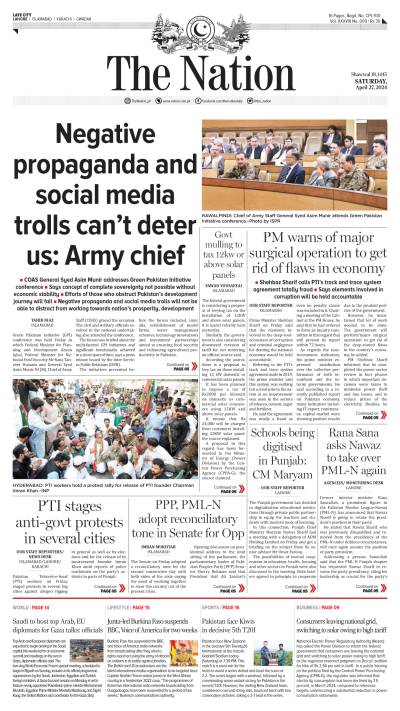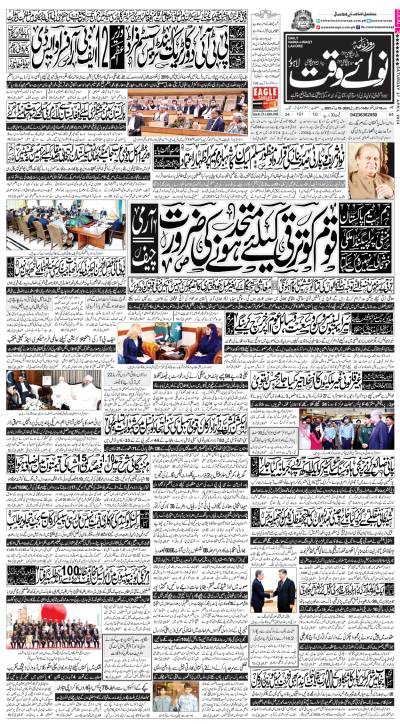S M Hali Mubashar Javed Akbars latest book entitled Tinderbox: The Past and Future of Pakistan is the portrayal of a dismal future of Pakistan based on the distortion of facts and the twisting of history. He has received excellent comments about his book from the West and India, because anything coming from the pen of a Muslim that is insulting for Pakistan or the Muslims is hailed as a masterpiece of literature. Finding fault with everything Pakistani, and referring to Quaid-i-Azam, M.J. Akbar in his book states: Jinnah envisaged Pakistan as an India-style democracy. Yet, he also helped begin its descent by playing upon chauvinist Muslim fears for political gain. Then the 'so-called notorious scholar claims: The idea of India is stronger than the Indian; the idea of Pakistan is weaker than the Pakistani. His rationale is weak on two counts. First, because he believes that Indias 160 million Muslims are free and no worse off than Pakistans 180 million. Second, the Islamic rationale for Pakistan contained an ambiguity about the role of Islam in the new state, which has given rise to extremism and the germ of theocracy lay in Pakistans genes. Nevertheless, Akbar should have only looked at the appalling condition of the Muslims in India before he had passed a judgment on state of the Muslims in Pakistan. As a Muslim, he must surely be aware of the genocide of Muslims being committed in Kashmir and other Indian states. He must certainly be cognisant of Justice Rajindar Sachar Commissions Report, whose findings are a shocking testimony to six decades of institutional neglect and bias that has left Indian Muslims far behind other Socio-Religious Communities (SRCs) in the areas of education, employment, access to credit, access to social and physical infrastructure and political representation. In his book, Akbar says that when India and Pakistan began, in 1947, they shared many of the same people and a legal and administrative history going back five centuries. Questioning what explains their subsequent divergence, with India now broadly stable and prosperous and Pakistan crisis-ridden, Akbar provides a number of reasons for this. Indian Muslims had a history of violent opposition to the British that was at odds with Gandhis non-violence. Their elite felt superior to Hindus - a hangover from the Mughal Empire - and feared losing their residual privileges under Hindu rule. Then he opines that the calamity of partition, in which perhaps a million perished, might have been avoided. Here again, he stretches the truth regarding Gandhi. The sad fact is that generation after generation of Indians has been fed on the myth that Gandhi was a saint and a propagator of non-violence. One only has to refer to the works of Dr G. B. Singh, Dr Watson, and Gandhis two grandsons - Arun and Rajmohan Gandhi - to discover that Gandhi was a fraud and the international opinion fed on lies has come to accept him as a great reformer. The truth is that during his stay in South Africa, Gandhi endorsed a British war to suppress the movement by Black Africans to gain their freedom and served as a Sergeant Major in the British army, crushing the freedom fighters. Gandhis racism is obvious from his friendly overtures to Hitler, showering praise on him and asking all Jews to commit mass suicide. The Jewish Defence League, Anti-Defamation League, Israel and the Jewish world abhors Gandhi. The 109th Congress of the United States of America condemned him for his racism. More so, Indias efforts to promote Gandhi for the Nobel Peace Prize were spurned due to his war-mongering approach and inviting the Government of India to wage war on Pakistan at the accession of Kashmir. As proof, the Nobel Peace Prize Committee produced the telegram sent by Gandhi to the government. Unfortunately, M.J. Akbars biases, perhaps, under the influence of his Hindu grandfather and wife, get the better of him forcing him to sacrifice truth at the altar of bigotry and hate. The writer is a political and defence analyst.
Sunday, April 28, 2024
Akbar badmouths Pakistan
Govt to establish special protection force for foreigners’ security
3:17 PM | April 27, 2024
Punjab govt on alert as PMD warns of heavy rains
1:05 PM | April 27, 2024
China unveils first Hangor-class submarine builit for Pakistan
12:28 PM | April 27, 2024
Rawalpindi BISE chief visits exam centres in Pindigheb
April 27, 2024
CDA organises E-Katcheri to facilitate residents
April 27, 2024
Political Tightropes
April 27, 2024
Wave of Revolution
April 27, 2024
Brave Peacekeepers
April 27, 2024
Economic Challenges
April 26, 2024
No Compromise
April 26, 2024
Korangi’s challenge
April 27, 2024
US double standard
April 27, 2024
Political turmoil
April 27, 2024
Photon power
April 26, 2024
Justice prevails
April 26, 2024
ePaper - Nawaiwaqt
Advertisement
Nawaiwaqt Group | Copyright © 2024





